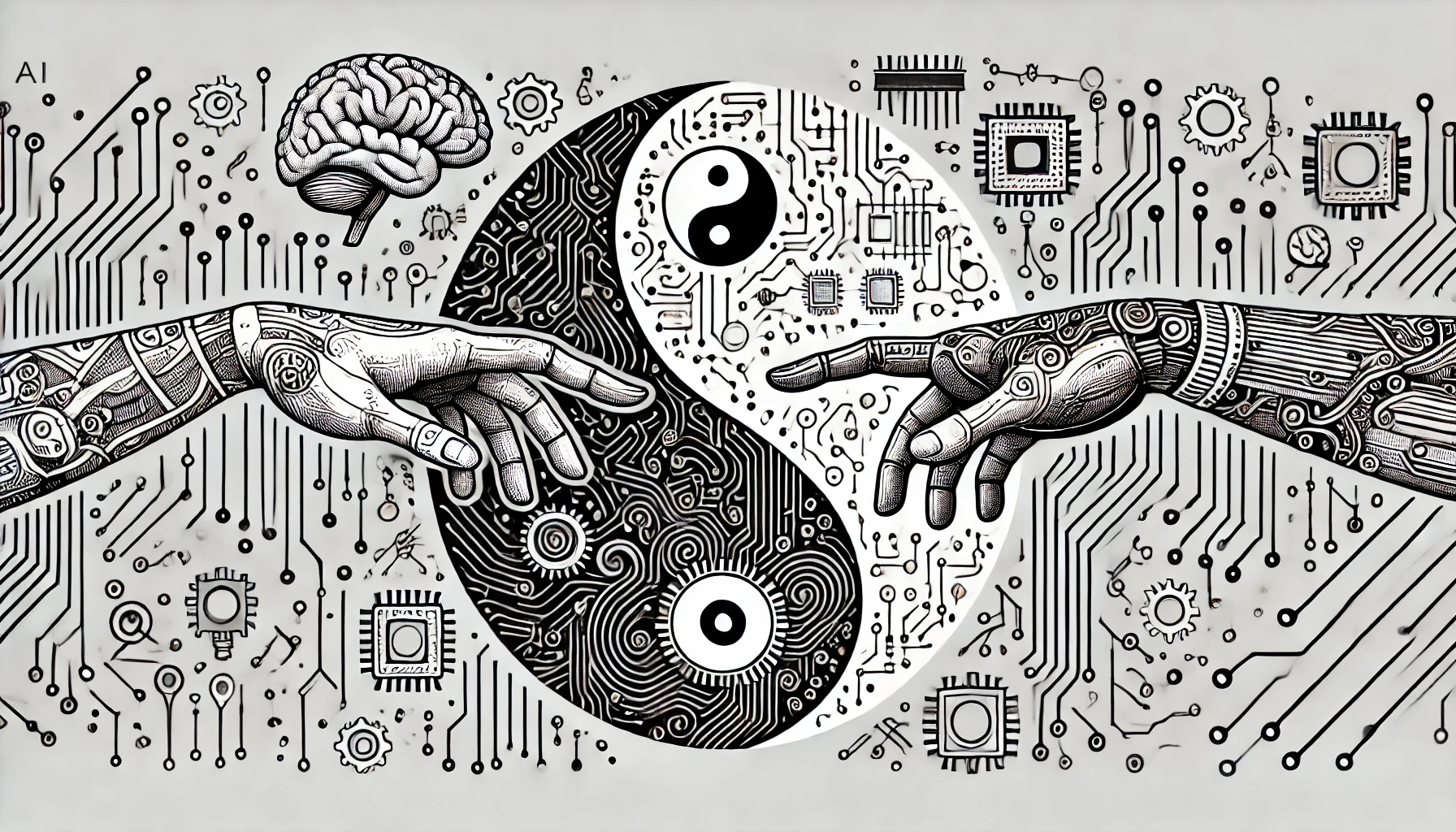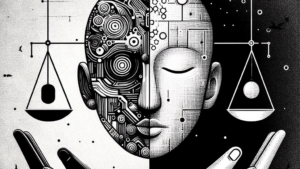As AI revolutionises various industries, its integration into technical support raises crucial questions about balancing efficiency with the human touch. This blog post explores the ethical considerations and impact on humanity when implementing AI in customer service interactions.
I’ve recently been grappling with the complex issue of integrating AI into our support processes. This evaluation has led me to reflect deeply on the potential benefits and pitfalls of a combined approach where AI handles in a support context, particularly considering my core values: transparency, compassion, radical candour, and emotional intelligence.
The Promise of AI in Technical Support: A Double-Edged Sword?
The allure of AI in technical support is undeniable. With its 24/7 availability and lightning-fast response times, it promises to revolutionise how we handle customer queries. In our global B2B environment, where clients span multiple time zones, this round-the-clock support could be a fundamental change.
Take, for instance, a recent trial of an AI chatbot for handling routine password reset requests. The AI chatbot delivered impressive results: it reduced the average response time from 15 minutes to mere seconds, freeing up our team to tackle more complex issues.
However, this efficiency comes with a caveat: we ensure that in our pursuit of speed, we don’t lose sight of the nuanced human aspects of support that our clients value.
Ethical Considerations: Navigating the AI Minefield
As we venture further into AI territory, we’re confronted with a host of ethical quandaries. Transparency is paramount. We have a moral obligation to inform our clients when they’re interacting with AI, but how do we do this without undermining the seamless experience we’re striving to create?
The spectre of data privacy looms large. Our clients entrust us with sensitive information, and we ensure that our AI systems are not just efficient, but also impenetrable fortresses of data security. This isn’t just about compliance; it’s about maintaining the trust that forms the bedrock of our client relationships.
Perhaps most insidiously, we must be vigilant about potential biases in our AI algorithms. In our diverse global team, we’ve seen firsthand how cultural differences can lead to misunderstandings. How do we ensure our AI doesn’t perpetuate these biases, but helps to bridge cultural divides?
The Human Element: Our Secret Weapon
While AI excels at handling routine queries, it’s in the realm of complex, emotionally charged situations that human support truly shines.
This human touch – the ability to empathise, to read between the lines, to build genuine relationships – is our secret weapon. It’s what transforms a transactional interaction into a partnership, fostering the brand loyalty that AI alone cannot cultivate.
Finding the Right Balance: The Art of the Hybrid Model
The key, I believe, lies in striking a delicate balance between AI efficiency and human empathy. We’re exploring a hybrid model where AI handles initial triage, swiftly resolving straightforward issues, while seamlessly escalating complex or sensitive matters to our human agents.
However, this isn’t a simple handoff. We’re training our AI to recognise not just technical complexity, but emotional nuance. When a client’s frustration levels rise, or when cultural subtleties come into play, the AI needs to know when to bring in human expertise.
Crucially, this is not a ‘set it and forget it’ solution. We’re implementing a system of continuous improvement, where our human team provides regular feedback to refine and enhance our AI’s capabilities. This creates a symbiotic relationship, with the AI learning from human insights and humans being freed to focus on high-value interactions.
Impact on Our Team: Embracing Change, Fostering Growth
Let’s address the elephant in the room: the fear of job displacement. It’s a valid concern, and one we’re tackling head-on with transparency and compassion. Yes, AI will change the nature of support roles, but I see this as an opportunity for growth rather than a threat.
We’re investing in reskilling programmes, helping our team transition from routine task handlers to high-value problem solvers and relationship builders.
This shift requires a culture of continuous learning and adaptation. I’ll fostering this through regular ‘AI and Us’ workshops, where team members share experiences, voice concerns, and collaboratively shape our AI strategy. It’s challenging, yes, but also invigorating – we’re not just adapting to change, we’re driving it.
Customer Perceptions: Bridging the Generation Gap
Our client base is diverse, spanning tech-savvy startups to traditional enterprises, and their attitudes towards AI support vary wildly. We’ve observed a clear divide: some clients prefer AI for its speed and 24/7 availability, while some value human interaction more highly.
To bridge the AI trust gap, we need to focus on education, creating transparent, jargon-free resources that explain how our AI works, its capabilities and limitations, and how we safeguard data privacy. By demystifying AI, we build confidence across all client segments.
The Irreplaceable Human Touch: Why Exceptional Support Will Always Need People
While AI continues to revolutionise technical support, there are compelling reasons human involvement will remain crucial for delivering truly exceptional service:
- Emotional Intelligence: Humans excel at reading emotional cues, empathising with frustrations, and providing comfort in ways AI cannot replicate.
- Complex Problem Solving: Humans can think creatively, draw on diverse experiences, and tackle unique issues that fall outside an AI’s training parameters.
- Building Relationships: The ability to form genuine connections, remember personal details, and foster long-term loyalty is uniquely human.
- Cultural Nuance: Humans navigate cultural sensitivities and communication styles with a finesse that AI struggles to match.
- Ethical Decision Making: In situations requiring moral judgments or handling sensitive information, human oversight is indispensable.
AI efficiency paired with human empathy, adaptability, and ethics creates exceptional experiences. As we move forward, the most successful support strategies will be those that leverage AI’s strengths while preserving and amplifying these irreplaceable human qualities.
Embracing the AI Revolution with a Human Heart
As we navigate this AI revolution in technical support, we’re guided by a simple yet powerful principle: technology should enhance, not replace, human connection. Our goal is to create a support ecosystem where AI and humans work in harmony, each playing to their strengths to deliver exceptional client experiences.
This journey presents challenges. We’ll face technical hurdles, ethical dilemmas, and adapting constantly. But I’m excited about the possibilities. By embracing AI with open eyes and open hearts, always keeping our human values at the forefront, we can redefine what technical support can be.
In this brave new world of AI-augmented support, we will measure our success not just in response times and resolution rates, but in the strength of the relationships we build, the trust we earn, and the positive impact we have on our clients’ businesses and our support teams lives.
Key Takeaways
- Balance AI efficiency with human empathy: Implement a hybrid model where AI handles routine queries, allowing human agents to focus on complex issues requiring emotional intelligence.
- Address ethical concerns: Ensure transparency in AI interactions, prioritise data privacy, and actively work to prevent algorithmic biases.
- Invest in team development: Focus on developing support teams to adapt to AI integration, fostering a culture of continuous learning and growth.
- Educate clients: Bridge the AI trust gap by providing transparent information about AI capabilities and limitations in support.
- Preserve the human touch: Recognise that while AI enhances efficiency, human qualities like empathy, complex problem-solving, and relationship-building remain irreplaceable in exceptional support.
- Continuous improvement: Implement feedback loops between AI systems and human agents to refine and enhance AI capabilities.
- Measure holistic success: Evaluate support performance not just on metrics like response times, but also on the strength of client relationships and positive impact on businesses.







